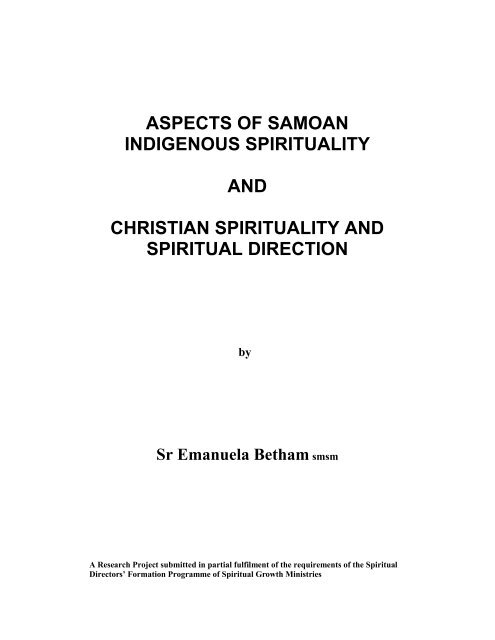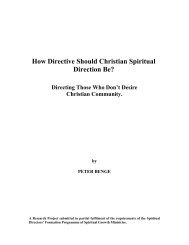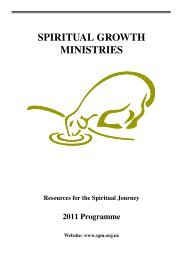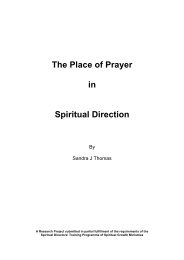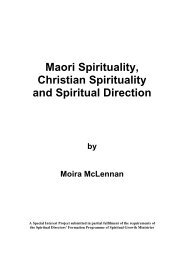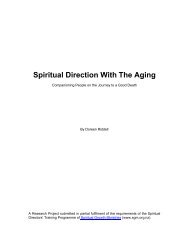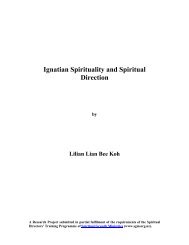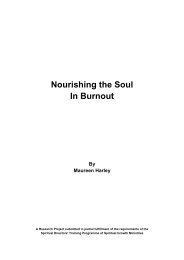aspects of samoan indigenous spirituality and christian spirituality
aspects of samoan indigenous spirituality and christian spirituality
aspects of samoan indigenous spirituality and christian spirituality
Create successful ePaper yourself
Turn your PDF publications into a flip-book with our unique Google optimized e-Paper software.
ASPECTS OF SAMOAN<br />
INDIGENOUS SPIRITUALITY<br />
AND<br />
CHRISTIAN SPIRITUALITY AND<br />
SPIRITUAL DIRECTION<br />
by<br />
Sr Emanuela Betham smsm<br />
A Research Project submitted in partial fulfilment <strong>of</strong> the requirements <strong>of</strong> the Spiritual<br />
Directors’ Formation Programme <strong>of</strong> Spiritual Growth Ministries
Contents<br />
Introduction<br />
1. Spirituality – a definition<br />
2. Christian Spirituality <strong>and</strong> Spiritual Direction<br />
3. Samoan Spirituality – Some Aspects <strong>and</strong> contributions to Christian<br />
Spirituality <strong>and</strong> Spiritual Direction<br />
a) Samoan Myths <strong>of</strong> Creation: its centrality, life force <strong>and</strong> spirit<br />
b) Pre-Christian Samoan Concept <strong>of</strong> Aiga, (extended family), Values<br />
<strong>and</strong> Beliefs - Christianity exp<strong>and</strong>s <strong>and</strong> affirms<br />
c) Spirituality <strong>of</strong> Harmonies in Samoan Traditional Society; Samoan<br />
Concepts <strong>of</strong> Tapu (taboos), Tuaoi (boundaries), Feagaiga (sacred<br />
covenant) : A legacy <strong>of</strong> insights <strong>and</strong> wisdom <strong>of</strong> ancestors <strong>and</strong><br />
forebears<br />
d) Harmony Between Man <strong>and</strong> Self in Samoan Traditional Spirituality<br />
<strong>and</strong> a Comparison with Christian Spirituality <strong>and</strong> Direction<br />
e) The Peer <strong>and</strong> Elder Mentoring in Traditional Samoan Society<br />
Conclusion<br />
Bibliography<br />
Glossary<br />
Acknowledgements<br />
1<br />
© Spiritual Growth Ministries 2008
INTRODUCTION<br />
“O fanau a tagata e fafaga I upu<br />
O fanau a manulele e usu I fuga o laau.” 1<br />
A Translation: The young <strong>of</strong> humans are fed with words.<br />
The young <strong>of</strong> birds are fed with blossoms<br />
(nectar) <strong>of</strong> trees <strong>and</strong> plants.<br />
Language is essential in any culture, for it is through language that the spirit <strong>and</strong><br />
essence <strong>of</strong> cultures, myths <strong>and</strong> legends, are expressed, experienced, <strong>and</strong> lived. 2<br />
God is present in every culture, <strong>and</strong> every culture is able to express some truths about<br />
God to its own people. Traditional Samoans saw their culture as the basis <strong>and</strong><br />
foundation <strong>of</strong> their underst<strong>and</strong>ing <strong>of</strong> how God had interacted with them. Culture is<br />
life, always changing <strong>and</strong> adapting. Cultural learning must have a good solid<br />
foundation <strong>and</strong> we see this in the elder/parent-child relationship in early Samoan<br />
society.<br />
On-going cultural <strong>and</strong> social change in society highlights the need to underst<strong>and</strong> the<br />
cultural <strong>and</strong> religious context in which we work as spiritual directors. As a Samoan,<br />
training in this ministry, I am interested to explore some <strong>aspects</strong> <strong>of</strong> Samoan<br />
<strong>indigenous</strong> <strong>spirituality</strong> <strong>and</strong> its contributions to Christianity <strong>and</strong> spiritual direction. I<br />
would also like to compare <strong>and</strong> contrast spiritual direction with the ‘peer <strong>and</strong> elder<br />
mentoring’ <strong>of</strong> Samoan <strong>indigenous</strong> religion <strong>and</strong> <strong>spirituality</strong><br />
In Samoan traditional society, the gr<strong>and</strong>parents, elders <strong>and</strong> parents have the primary<br />
responsibility <strong>of</strong> “….fafaga I upu”, feeding (children) with words, 'the nurturing to<br />
being, feeling, knowing, doing …' 3 with faaSamoa, the Samoan way <strong>of</strong> life. The<br />
matai, village <strong>and</strong> whole community join in this on-going responsibility <strong>of</strong> learning<br />
<strong>and</strong> living as the young are instructed, directed <strong>and</strong> guided in cultural ways <strong>and</strong> values<br />
<strong>of</strong> respect <strong>and</strong> good relationships. It is here in the loving presence <strong>of</strong> family mentors<br />
1 T<strong>of</strong>aeona Tanuvasa Taavale p.3 #9, 10.<br />
2 Rev Humberto Ramos Salazar, Aymara Spirituality: A Challenge for Christian Spirituality p.2<br />
Download 11/07/07 hhp://www.wcc-coe.org/wcc/whaat/jpc/echoes –16-08.html<br />
3 Filifilia Tamasese A Paper: "Samoan Customs & the Rights <strong>of</strong> Children"<br />
2<br />
© Spiritual Growth Ministries 2008
that the children through their everyday life experiences began to learn <strong>and</strong> assimilate<br />
the message <strong>of</strong> culture <strong>and</strong> the living spirit <strong>of</strong> faaSamoa.<br />
I came from a family where the “feeding with words” seemed to be unending, or so<br />
we thought as children. Looking back I valued <strong>and</strong> appreciated the learning <strong>and</strong><br />
bonding received from my maternal gr<strong>and</strong>mother, Mama Ake <strong>and</strong> some elderly<br />
women <strong>of</strong> our extended family in this upbringing. Examples are, the slight bow <strong>of</strong> the<br />
upper body <strong>and</strong> saying tulou when passing in front <strong>of</strong> people, or sitting down on the<br />
floor when talking to/at by elders, matai, pastor, or adult visitor. These examples <strong>and</strong><br />
hundreds <strong>of</strong> others are forms <strong>of</strong> respect, al<strong>of</strong>a <strong>and</strong> good relationships, for faaSamoa is<br />
built on al<strong>of</strong>a on love.<br />
The focus in all <strong>of</strong> our learning is on life – living <strong>and</strong> breathing the spirit, values <strong>and</strong><br />
mores <strong>of</strong> our Samoan heritage <strong>and</strong> <strong>spirituality</strong>, as we continue to grow into other<br />
levels <strong>and</strong> relationships <strong>of</strong> our social structure <strong>and</strong> life.<br />
1. SPIRITUALITY - A DEFINITION<br />
Spirituality can be defined as a way a person lives his/her everyday life in view <strong>of</strong><br />
his/her relationship to the gods/the ‘spirit’ world. It is “a mysterious inner force that<br />
animates a person’s life <strong>of</strong> faith, <strong>and</strong> moves a person’s faith to greater depths <strong>and</strong><br />
perfection.” 4<br />
Spirituality is life expressed in solidarity, a communion with the whole <strong>of</strong> creation,<br />
the very life <strong>of</strong> a people, their history, stories <strong>of</strong> creation, myths, legends <strong>and</strong> culture.<br />
It speaks <strong>of</strong> their way <strong>of</strong> thinking (mentality) hopes, beliefs, values <strong>and</strong> aspirations. 5<br />
An important element <strong>of</strong> <strong>spirituality</strong> is prayer. Spirituality has to do with our<br />
experiencing <strong>of</strong> God, with the transformation <strong>of</strong> our consciousness <strong>and</strong> our lives as<br />
outcomes <strong>of</strong> that experience. 6<br />
4 Alister E McGrath, Christian Spirituality. An Introduction. Adult Education <strong>and</strong> Formation.<br />
Download: 19/07/07 http://www.stjohnadulted.org/spir-1.htm<br />
5 Rev. Humberto Ramos Salazar, Aymara Spirituality: A Challenge for Christian Spirituality:<br />
Download 11/07/07 hhp://www.wcc-coe.org/wcc/what/jpc/echoes-16-08.html<br />
6 Richard O’Brien in Catholicism p.1058 Download as in 4 above<br />
3<br />
© Spiritual Growth Ministries 2008
From a cultural <strong>and</strong> religious Christian perspective, defining <strong>spirituality</strong> is necessary<br />
in order to explore the significant part it plays in the spirit life <strong>of</strong> a people, e.g. the<br />
Samoans in their personal <strong>and</strong> communal way <strong>of</strong> life.<br />
2. CHRISTIAN SPIRITUALITY <strong>and</strong> SPIRITUAL DIRECTION<br />
Christian <strong>spirituality</strong> is essentially life in the Spirit. It is the way one lives one’s life<br />
so that it is easier not harder for God to enter into that life. Christian <strong>spirituality</strong> has a<br />
variety <strong>of</strong> forms, for example, a lay <strong>spirituality</strong>, a monastic <strong>spirituality</strong>, a Marist<br />
<strong>spirituality</strong>, a Franciscan <strong>spirituality</strong>. Christian <strong>spirituality</strong> is an awareness <strong>of</strong> our<br />
relationship to God, to self, to others <strong>and</strong> all <strong>of</strong> creation. It is a way <strong>of</strong> life lived <strong>and</strong><br />
based on the values <strong>and</strong> teachings <strong>of</strong> the Gospels <strong>of</strong> Jesus Christ <strong>and</strong> in Scriptures.<br />
Christian <strong>spirituality</strong> is the revelation <strong>of</strong> God in our most intimate being, it is our daily<br />
living experience <strong>of</strong> our faith in Jesus Christ our Lord <strong>and</strong> Saviour who came to<br />
overcome death <strong>and</strong> will come again in glory. 7<br />
Christian <strong>spirituality</strong> is the quest for a fulfilled <strong>and</strong> authentic life that involves taking<br />
the beliefs <strong>and</strong> values <strong>of</strong> Christianity <strong>and</strong> weaving them into the fabrics <strong>of</strong> our lives,<br />
so that they ‘animate’ provide the ‘breathe’ <strong>and</strong> ‘spirit’ <strong>and</strong> ‘fire’ for our lives. 8<br />
Christian Spiritual Direction “is direction <strong>of</strong>fered in the prayer life <strong>of</strong> the individual<br />
Christian. It is an art which includes helping to discern the movement <strong>of</strong> the Holy<br />
Spirit in our life, assisting in the difficult task <strong>of</strong> obedience to these movements, <strong>and</strong><br />
<strong>of</strong>fering support in the crucial life decision that our faithfulness requires.” 9<br />
Spiritual Direction is “holy listening, presence <strong>and</strong> attentiveness.” 10<br />
7 Aymara Spirituality: A Challenge for Christian Spirituality p.3.<br />
8 Alister E McGrath, Christian Spirituality. An Introduction p.3<br />
9 Henri Nouwen, quoted in Andrew Dunn 1993, Oasis Brochure #3<br />
10 Margaret Guenther, quoted in Andrew Dunn 1993, Oasis Brochure #3<br />
4<br />
© Spiritual Growth Ministries 2008
“The experience in faith, hope <strong>and</strong> love that Jesus is my Saviour <strong>and</strong> the world’s <strong>and</strong><br />
that I want to respond to him is the heart <strong>of</strong> Christianity <strong>and</strong> that heart is prayer <strong>and</strong><br />
life based on prayer.” 11<br />
Different social customs affect the ways in which human relationships are conducted,<br />
as can be seen in the Samoan traditional way <strong>of</strong> praying <strong>and</strong> encountering God.<br />
3. SAMOAN SPIRITUALITY – SOME ASPECTS AND CONTRIBUTIONS TO<br />
CHRISTIAN SPIRITUALITY AND SPIRITUAL DIRECTIONS<br />
a) Samoan Myths <strong>of</strong> Creation – Centrality, Life Force <strong>and</strong> Spirit 12<br />
Samoan <strong>spirituality</strong> is the way the Samoans traditionally lived their lives with regard<br />
to the world <strong>of</strong> the gods/spirits as they understood it. They believed in a ‘spirit’<br />
world, which pervaded their physical world, <strong>and</strong> the gods manifest themselves in<br />
various ways in which they were involved in the daily life <strong>of</strong> the people. Therefore,<br />
the people had to be careful not to break any known tapu (taboos)<strong>of</strong> the gods.<br />
The Samoan <strong>indigenous</strong> religion <strong>and</strong> <strong>spirituality</strong> are rooted in the Polynesian Myths <strong>of</strong><br />
Creation held by the Samoan people. Myths seek to reveal truth, <strong>and</strong> for the Samoans<br />
these tala o le vavau, are important <strong>and</strong> their influences pervade the <strong>spirituality</strong>,<br />
mysteries <strong>of</strong> life, their underst<strong>and</strong>ing <strong>of</strong> God, creation, rituals <strong>and</strong> culture, <strong>and</strong> how<br />
they see the universe <strong>and</strong> the world around them. Hence, the need to revisit these<br />
myths <strong>of</strong> creation if we are to underst<strong>and</strong> what breathes <strong>and</strong> animates the '‘spirit'’ <strong>of</strong><br />
the spirit-life <strong>of</strong> the Samoans.<br />
Space <strong>and</strong> scope <strong>of</strong> this topic put limits on detailed coverage in this section.<br />
Samoan Indigenous Religion believed in the existence <strong>of</strong> many gods, <strong>and</strong> a Supreme<br />
Being whom they named Atua Tagaloa. Atua Tagaloa created papa(rock), the base<br />
<strong>and</strong> foundation stuff from which he created the world, the sea, the fresh water <strong>and</strong> the<br />
sky.<br />
11 Barry <strong>and</strong> Connolly, The Practice <strong>of</strong> Spiritual Direction, p.17<br />
12 Rev. T, Powel/G.Pratt/Dr F.Frazer, Samoan Story <strong>of</strong> Creation, Journal <strong>of</strong> Polynesia Society Vol.1.<br />
Download 30/07/07 http://www.sacred –texts.com/pac/polys/ssc.htm<br />
5<br />
© Spiritual Growth Ministries 2008
After creating lagi (the heavens) <strong>and</strong> lalo-lagi (the earth), Atua Tagaloa created<br />
tagata (persons) into living human beings <strong>of</strong> both male <strong>and</strong> female. He endowed<br />
tagata with his own Spirit, Heart, Will <strong>and</strong> Thought, <strong>and</strong> thus humans became living<br />
souls, with loto (affections) finagalo (wills) manatu/masalo (power <strong>of</strong> thought),<br />
atamai (human intelligence) with a physical <strong>and</strong> spiritual complex nature. Atua<br />
Tagaloa set forth humans as living spirits on the earth.<br />
Traditional Samoans believed that they originated from the gods, Lagi <strong>and</strong> Papa, who<br />
were issues <strong>of</strong> Atua Tagaloa, their first ancestor <strong>and</strong> progenitor. Atua Tagaloa created<br />
the cosmos, the earth, all life forms including humans. The Samoans were convinced<br />
that their connections <strong>and</strong> relationship with all creation were rooted in their common<br />
divine ancestral beginnings.<br />
In Pre-Christian Samoa, Atua Tagaloa was the name given to God, the Supreme<br />
Being, creator, progenitor – the God <strong>of</strong> the Samoans. The elimination <strong>of</strong> the term<br />
Tagaloa, exp<strong>and</strong>s the Christian theological concept <strong>of</strong> Atua, whom the Samoans<br />
recognized as Supreme Being, the same Supreme Being worshipped by the<br />
Christians. The Atua is not just for the Samoans but for the whole human world. The<br />
Samoans accepted the Christian explanation <strong>of</strong> God as the triune Godhead, because<br />
the Trinitarian doctrine was not entirely new to the people, who were aware <strong>of</strong> God,<br />
the Supreme Being revealing himself to them in more than one way – the creator,<br />
visitor, messenger, progenitor, matai, <strong>and</strong> so on. 13<br />
b) Pre-Christian Samoan Concept <strong>of</strong> Aiga (extended family), Values <strong>and</strong> Beliefs:<br />
Christianity affirms <strong>and</strong> Exp<strong>and</strong>s these Values <strong>and</strong> Beliefs 14<br />
“Spirituality is relational <strong>and</strong> is grounded in a healthy self-image, <strong>and</strong> grows within<br />
the context <strong>of</strong> life affirming <strong>and</strong> nurturing relationships." 15<br />
Traditional Samoan<br />
social structure <strong>and</strong> organization <strong>of</strong> aiga illustrate this nurturing relationship in the life<br />
<strong>and</strong> spirit <strong>of</strong> Samoan society. “O fanau a tagata e fafaga I upu….” The children <strong>of</strong><br />
humans are fed with words, ‘words’ which convey that solid foundation, that healthy<br />
self-image, life <strong>and</strong> spirit <strong>of</strong> a people; its living way <strong>of</strong> life – the faaSamoa. Family<br />
13 Lolomilo Kamu, “The Samoan Culture <strong>and</strong> The Christian Gospel” Methodist Printing Press Apia<br />
1996<br />
14 As in 12 above<br />
6<br />
© Spiritual Growth Ministries 2008
mentors take up the responsibility <strong>of</strong> guiding <strong>and</strong> directing them, as they continue to<br />
experience the wider perspective <strong>of</strong> Samoan life <strong>and</strong> culture. It is in the aiga <strong>and</strong><br />
village community that young adults are exposed to the ‘life <strong>of</strong> service’ <strong>and</strong> ‘the art <strong>of</strong><br />
serving others’ as this proverb also affirms ‘o le ala I le pule o le tautua’, meaning the<br />
way to leadership is service. These two cultural values in Samoan traditional society<br />
are also values in Jesus teaching on service – Jesus, the ‘man for others’ who came<br />
to serve <strong>and</strong> not to be served. 16<br />
Traditional Samoan leadership emphasizes the cultural values <strong>of</strong> service, sharing <strong>and</strong><br />
caring. This is intended for the matai <strong>and</strong> his aiga, where the matai is head <strong>and</strong><br />
coordinator <strong>of</strong> the affairs <strong>of</strong> the aiga, <strong>and</strong> the aiga reciprocates <strong>and</strong> gives active<br />
support <strong>and</strong> service to their matai. The system works well if it’s built on al<strong>of</strong>a <strong>and</strong><br />
respect.<br />
Christ’s way <strong>and</strong> model <strong>of</strong> leadership strengthens the spirit <strong>of</strong> serving, sharing <strong>and</strong><br />
caring in the aiga <strong>and</strong> community. Christianity exp<strong>and</strong>s the concept <strong>of</strong> aiga to<br />
include the world human family <strong>and</strong> Christ as head. Today’s modern culture, not just<br />
for Samoa but the world at large, <strong>and</strong> its emphasis on capitalism, materialism <strong>and</strong><br />
individualism, continually challenge these traditional <strong>and</strong> Gospel values <strong>and</strong> spirit. In<br />
the work <strong>of</strong> spiritual direction, the director could invite, encourage <strong>and</strong> challenge the<br />
practice <strong>of</strong> these traditional <strong>and</strong> Gospel values in the directee’s prayer life <strong>and</strong> in the<br />
service <strong>of</strong> others.<br />
c) Spirituality <strong>of</strong> Harmonies in Samoan Traditional Society : <strong>and</strong> Samoan<br />
Concepts <strong>of</strong> Tapu (taboo), Feagaiga (sacred covenant), <strong>and</strong> Tuaoi<br />
(boundaries) 17<br />
The Samoan <strong>indigenous</strong> religion holds that peace <strong>and</strong> harmony are spiritual elements<br />
at the heart <strong>of</strong> creation, hence the continual search for it, <strong>and</strong> the existence <strong>of</strong><br />
established cultural ways <strong>and</strong> mores <strong>of</strong> maintaining <strong>and</strong> reinstating this unity <strong>and</strong><br />
peace in the social <strong>and</strong> religious life <strong>of</strong> the Samoans.<br />
In traditional Samoan society there exist four special relationships known as key<br />
harmonies :<br />
15 Hamma R.A. L<strong>and</strong>scapes <strong>of</strong> the Soul: A Spirituality <strong>of</strong> Place p.19<br />
16 Luke 22: 26 - 27<br />
17 Tui Atua Tupua Tamasese Efi: "In Search <strong>of</strong> Harmony: Peace in the Samoan Indigenous Religion"<br />
"Physician Heal Thyself : Planning for the next Generation"<br />
7<br />
© Spiritual Growth Ministries 2008
Relationship between human beings<br />
Relationship between human beings <strong>and</strong> the cosmos<br />
Relationship between human beings <strong>and</strong> the environment<br />
Relationship between man <strong>and</strong> self<br />
These four relationships constitute the “four key harmonies” for Samoan <strong>indigenous</strong><br />
religion <strong>and</strong> <strong>spirituality</strong> in its search for peace <strong>and</strong> harmony. When each one <strong>and</strong><br />
together <strong>of</strong> the four harmonies find equilibrium, then there is peace <strong>and</strong> harmony.<br />
The traditional Samoan concepts <strong>of</strong> tapu, feagaiga <strong>and</strong> tuaoi are important in defining<br />
the types <strong>of</strong> relationships <strong>and</strong> harmonies in this equation <strong>of</strong> peace for Samoans.<br />
Tui Atua Tupua Tamasese Efi attributed his personal experiences <strong>and</strong> self-reflections<br />
on peace <strong>and</strong> harmony for Samoans to the wisdom <strong>and</strong> insights <strong>of</strong> his ancestors,<br />
forebears <strong>and</strong> mentors! I would like to use some <strong>of</strong> the ‘fruits’ <strong>of</strong> his self-reflections<br />
<strong>and</strong> personal experiences, <strong>and</strong> the story <strong>of</strong> Tapuitea to discuss <strong>and</strong> illustrate further<br />
additional contributions <strong>of</strong> Samoan Indigenous Religion <strong>and</strong> Spirituality to<br />
Christianity <strong>and</strong> Spiritual Direction.<br />
The ancient Samoan story <strong>of</strong> Tapuitea, illustrates for me relationships, disharmonies<br />
<strong>and</strong> restorations <strong>of</strong> peace, healing <strong>and</strong> harmony for traditional Samoans. Tapuitea<br />
was an earth-bound human female cannibal who fed on her siblings <strong>and</strong> relatives.<br />
Tapuitea was seriously reprim<strong>and</strong>ed by her parents, <strong>and</strong> in obedience to them she<br />
gave up cannibalism <strong>and</strong> decided to make amends by promising to leave earth <strong>and</strong><br />
ascend to the heavens where she will appear as the morning <strong>and</strong> evening star. From<br />
the heavens she will guide fishing <strong>and</strong> navigational expeditions, planting <strong>and</strong> other<br />
cosmic-earth related activities. Her story when told, reminds both the young <strong>and</strong> the<br />
old that Tapuitea was from the earth. That she broke tapu, feagaiga <strong>and</strong> tuaoi<br />
relationship, but was truly repentant. Her remorse <strong>and</strong> presence in the heavens as<br />
morning <strong>and</strong> evening star – a source <strong>of</strong> guidance for her relatives <strong>and</strong> kin, won her<br />
their forgiveness. Her story <strong>and</strong> message are still been told as a reminder <strong>of</strong> the<br />
importance <strong>of</strong> this balance <strong>of</strong> peace <strong>and</strong> harmony between humans, between humans<br />
8<br />
© Spiritual Growth Ministries 2008
<strong>and</strong> the cosmos, <strong>and</strong> the importance <strong>of</strong> repentance <strong>and</strong> forgiveness, inner healing <strong>and</strong><br />
peace in Samoan society.<br />
Concepts <strong>of</strong> feagaiga, tuaoi <strong>and</strong> tapu relations are pivotal in keeping the peace <strong>and</strong><br />
harmony between human beings. Disharmony happens when one <strong>of</strong> these concepts<br />
in relationships is broken, misunderstood, or not respected. The co-existence <strong>of</strong><br />
attitudes <strong>of</strong> remorse <strong>and</strong> forgiveness, or the resorting to the aiga family disposition <strong>of</strong><br />
al<strong>of</strong>a in their compassion <strong>and</strong> forgiveness, as seen in the ancient story <strong>of</strong> Tapuitea,<br />
can also help maintain peaceful relationships <strong>and</strong> harmony in Samoan society.<br />
The harmony between brother <strong>and</strong> sister operates on the cultural sacred relationship<br />
<strong>of</strong> feagaiga, where mutual respect between brother <strong>and</strong> sister is expected. Feagaiga<br />
operates on all core human relationships in the family <strong>and</strong> in Samoan society. Peace<br />
<strong>and</strong> harmony exist when the sacred characters <strong>of</strong> these relationships are respected.<br />
Feagaiga, this sacred covenant, has its roots in the principle that women have the gift<br />
<strong>of</strong> producing <strong>and</strong> nurturing life, <strong>and</strong> as child-bearers, women share divinity with the<br />
gods, the family gods. Women were seen as having the power as intercessors,<br />
peacemakers, family conciliators, especially in times <strong>of</strong> family or community<br />
conflicts. Christian prayers <strong>of</strong> intercession <strong>and</strong> petitions, <strong>and</strong> help from mediation<br />
<strong>of</strong> religious leaders, in this context have a much wider scope, a more freeing spirit<br />
<strong>and</strong> a greater outreach than the traditional relational function <strong>of</strong> feagaiga.<br />
Christianity extends the concept <strong>and</strong> moral value <strong>of</strong> feagaiga to include all <strong>of</strong><br />
humanity. 18<br />
In justice issues, Samoan <strong>indigenous</strong> religion emphasized the value <strong>of</strong> restoration<br />
when seeking to restore family, community <strong>and</strong> personal harmony <strong>and</strong> healing. When<br />
feagaiga, tapu, tuaoi relations have been broken especially in serious crimes, as<br />
murder, adultery <strong>and</strong> rape, restoring harmony is urgent to avoid revenge. The Samoan<br />
ritual <strong>of</strong> ifoga is at the heart <strong>of</strong> restoring harmony, healing <strong>and</strong> peace when serious<br />
human rights have not been respected or broken. The family <strong>of</strong> the <strong>of</strong>fender prepares<br />
the ritual <strong>of</strong> ifoga, (public act <strong>of</strong> humiliation) in the hope <strong>of</strong> receiving forgiveness<br />
from the victim’s family. Often the spiritual pain <strong>of</strong> shame, guilt, <strong>and</strong> sense <strong>of</strong><br />
contrition, are carried not just by the <strong>of</strong>fender but also by his whole family <strong>and</strong><br />
18 Mainly - Acts. 17. 23<br />
9<br />
© Spiritual Growth Ministries 2008
community. Harmony <strong>and</strong> healing can only be restored when the ietoga <strong>of</strong> the ifoga<br />
had been lifted, accepted, <strong>and</strong> forgiveness granted. The ifoga is the <strong>of</strong>fender’s active<br />
sign <strong>of</strong> penance <strong>and</strong> remorse. The ifoga still holds today for Samoa as a spiritual <strong>and</strong><br />
public act <strong>of</strong> humiliation in restoring peace, harmony <strong>and</strong> healing between people <strong>and</strong><br />
communities.<br />
Samoan Roman Catholics on special celebrations sometimes use the<br />
symbolic ritual <strong>of</strong> ifoga at the Penitential Rite in the Eucharistic Liturgy <strong>of</strong> the Mass.<br />
Christian reconciliation is another easy transition for the Samoans, since restoring<br />
justice, peace <strong>and</strong> harmony between peoples, was already part <strong>of</strong> their religious<br />
experience. Christian forgiveness is founded in the love <strong>and</strong> mercy <strong>of</strong> God for sinful<br />
human beings, who are called to forgive. Jesus message on forgiveness is boundless.<br />
It is founded on love <strong>and</strong> respect for one another. 19<br />
d) Harmony Between Man <strong>and</strong> Self in Samoan Traditional Spirituality … A<br />
Comparison with Christian Spirituality <strong>and</strong> Direction. 20<br />
Humans as self-reflective beings <strong>and</strong> the harmony between man <strong>and</strong> self are reflected<br />
in the concept <strong>of</strong> anapogi <strong>and</strong> moe manatunatu, insights <strong>of</strong> traditional Samoans,<br />
<strong>of</strong>fered on issues <strong>of</strong> healing the body, mind <strong>and</strong> soul. Anapogi (fasting, self-denial)<br />
<strong>and</strong> moe manatunatu (meditation – a dream dialogue with the ancestors, family gods),<br />
were traditional ways <strong>of</strong> disciplining <strong>and</strong> calming the body, mind <strong>and</strong> spirit to peace<br />
<strong>and</strong> so facilitate the inner self to reflect <strong>and</strong> assess freely.<br />
Family mentors believed, that through the ritual <strong>of</strong> anapogi <strong>and</strong> moe manatunatu,<br />
peace <strong>of</strong> body, mind <strong>and</strong> soul, will follow. This will then help the inner self to reflect<br />
<strong>and</strong> converse with the gods, who will help them in making the right <strong>and</strong> appropriate<br />
decisions in the life <strong>of</strong> the family, village or community. This also applies to the self<br />
when praying for discernment or for personal spiritual development, healing <strong>and</strong><br />
strength. This can be likened to Christian prayer <strong>of</strong> contemplation <strong>and</strong> discernment,<br />
or in spiritual direction where the director helps the directee in seeking guidance <strong>of</strong><br />
the Spirit, <strong>and</strong> the will <strong>of</strong> God in decision making <strong>and</strong> healing <strong>of</strong> spirit. Anapogi <strong>and</strong><br />
moe manatunatu have similarities to the Christian spiritual exercises <strong>of</strong> fasting,<br />
retreats, contemplation <strong>and</strong> prayer. Prayer in its many forms <strong>and</strong> practices is an<br />
19 John 13.34<br />
20 Tui Atua Tupua Tamasese Efi: “In Search <strong>of</strong> Harmony: Peace in the Samoan Indigenous Religion.”<br />
“Physician Heal Thyself: Planning for the Next Generation”<br />
10<br />
© Spiritual Growth Ministries 2008
important element in Christian <strong>spirituality</strong>, where one <strong>of</strong> its aims <strong>and</strong> purposes is for<br />
the self to meet, encounter, <strong>and</strong> dialogue with God. One <strong>of</strong> the purposes in Christian<br />
spiritual direction is for the director to help <strong>and</strong> guide directee to discern <strong>and</strong> find her<br />
way <strong>of</strong> encountering <strong>and</strong> relating to God in her own life experiences <strong>and</strong> prayer.<br />
e) The Peer <strong>and</strong> Elder Mentoring in Traditional Samoan Society …<br />
The peer <strong>and</strong> elder mentoring in traditional Samoan is still valued today in Samoan<br />
society. It represents the heart <strong>and</strong> soul <strong>of</strong> nurturing relationship in the values <strong>of</strong> love<br />
<strong>and</strong> respect, a healthy self-image <strong>and</strong> cultural identity, bonding <strong>and</strong> stability.<br />
Learning through the process <strong>of</strong> personal mentoring, the mentee receives not only the<br />
knowledge <strong>of</strong> the mentor but also his/her mana, his/her spirit <strong>and</strong> wisdom.<br />
The relationship between the director <strong>and</strong> directee is based on trust, respect <strong>and</strong><br />
openness to the Spirit who works in both <strong>of</strong> them. The director listens <strong>and</strong> helps the<br />
directee in her learning, self-reflection <strong>and</strong> discernment, so to facilitate her<br />
encountering relationship with God through her life experiences <strong>and</strong> prayer. This is<br />
similar to the role <strong>and</strong> characteristics <strong>of</strong> the peer <strong>and</strong> elder mentor towards the mentee<br />
through the process <strong>of</strong> personal mentoring.<br />
The directee has the willingness or desire to grow in the life <strong>of</strong> God, (the self<br />
searching for that inner peace) <strong>and</strong> be open to be guided as in the process <strong>of</strong> spiritual<br />
direction. Again some similarities, the mentee has the desire (if not already<br />
ingrained) to grow in the life <strong>and</strong> wisdom <strong>of</strong> a Samoan as modelled by the mentor.<br />
Both help self-reflections <strong>and</strong> personal experiences in the search for that inner peace<br />
(God) <strong>and</strong> self.<br />
CONCLUSION<br />
I believe Samoan <strong>indigenous</strong> <strong>spirituality</strong> positively contributes to Christian<br />
<strong>spirituality</strong> in making people aware <strong>of</strong> the pervasiveness <strong>of</strong> the divine presence in all<br />
<strong>of</strong> human life <strong>and</strong> activity. Samoan <strong>indigenous</strong> religion as in the Christian Gospels<br />
<strong>and</strong> Scriptures reveals God’s involvement in human history. Here it is important to<br />
see one’s culture in the light <strong>of</strong> the Good News <strong>and</strong> to see the Good News in the eyes<br />
<strong>of</strong> one’s culture, the eyes <strong>of</strong> a Samoan. This brings me to a question. How in<br />
spiritual direction can I help <strong>and</strong> encourage a Samoan in this context, to go deeper<br />
11<br />
© Spiritual Growth Ministries 2008
into her underst<strong>and</strong>ing <strong>of</strong> Jesus’ teaching in the Gospels <strong>and</strong> to express them in her<br />
own way <strong>of</strong> life<br />
One <strong>of</strong> my Samoan friends commented that he once had a theory that the old religion<br />
is still alive in the Samoans under Christian labels. In spiritual direction, I see the<br />
need to be more open to the Spirit <strong>and</strong> be attentive <strong>and</strong> use the positive <strong>aspects</strong> <strong>of</strong> the<br />
traditional religion or cleanse its non Christian <strong>aspects</strong> in order for the directee to live<br />
in such a way that it makes it easier, not harder, for God to enter into her life as it is<br />
the way it is. Could this be an answer to the question I posed above<br />
Finally, in the Samoan <strong>indigenous</strong> religion, peace <strong>and</strong> harmony are spiritual elements<br />
in the heart <strong>of</strong> creation. And that Heart is Atua. The four key harmonies are each <strong>and</strong><br />
together about human beings continual search for that inner force/spirit, which is<br />
greater than oneself, <strong>and</strong> reflected in Augustine’s search “….for thou hast formed us<br />
for Thyself, <strong>and</strong> our hearts are restless till they find rest in thee.” 21 The emphasis is<br />
on the journey, our pilgrimage <strong>and</strong> searching. Spiritual direction <strong>and</strong> peer <strong>and</strong> elder<br />
mentoring are tools to help us on the journey so as to arrive at Harmony <strong>and</strong> Peace<br />
with God. For God is Harmony! God is Peace!<br />
21 .St Augustine, Bishop <strong>of</strong> Hippo, “Confessions” Chap.1 p.2.Download 01/01/97<br />
http:www.leaderu.com/cyber/books/augconfessions/books.html<br />
12<br />
© Spiritual Growth Ministries 2008
BIBLIOGRAPHY<br />
Barry, William A & Connolly William J<br />
The Practice <strong>of</strong> Spiritual Direction Seabury Press, New York<br />
Doyle, Bernard<br />
Encyclopedia Mythica: Mythology<br />
Download 30/07/07 http://www.pantheon.org/articles/mythology.html<br />
Hamma Robert M<br />
L<strong>and</strong>scapes <strong>of</strong> the Soul: A Spirituality <strong>of</strong> Place. Ave Maria Press Indiana<br />
Indigenous Australia – Spirituality<br />
Download 11/07/07 http.//www.dreamtime.net.au/<strong>indigenous</strong>/<strong>spirituality</strong>.cfm<br />
Indigenous Spirituality – Mountain Man’s News Archive<br />
Download 11/07/07 http.//www.mountainman.com.au/news98.f.htm<br />
Jones, Alex<strong>and</strong>er, (General Editor)<br />
Jerusalem Bible, the<br />
Eyre & Spottiswoode, London<br />
Kamu, Lolomilo<br />
The Samoan Culture <strong>and</strong> Christian Gospel Methodist Printing Press, Apia 1996<br />
McGraph Alister E<br />
Christian Spirituality. An Introduction. Blackwell Publishers 1999<br />
Download 19/07/07 http.//www.stjohnadulted.org/spir-1.htm<br />
Maori, The - Spirituality – New Zeal<strong>and</strong> History<br />
Download 18/07/07 http.//history-nz.org/maori.html<br />
Ojibway Rev Paul SA<br />
The Great Healing: Reflections on the Spirituality <strong>and</strong> Ceremonies <strong>of</strong> Peace in<br />
Native America. Colloquium on: Resources for Peace in Traditional Religion<br />
Pontifical Council for Interreligious Dialogue – Vatican January 2005<br />
Powell T, Pratt G, Frazer Dr J<br />
The Samoan Story <strong>of</strong> Creation. Journal <strong>of</strong> the Polynesian Society Vol 1<br />
Download, 30/07/07 http://www.sacred-texts.com/pac/jpolys/ssc.htm<br />
Pratt, Rev George,<br />
Grammar <strong>and</strong> Dictionary <strong>of</strong> the Samoan Language<br />
R McMillan Publishers Papakura New Zeal<strong>and</strong><br />
Religious Movement Homepage – Native American Religion<br />
Native American Spirituality<br />
Download, 16/07/07 http://religiousmovements.lib.virginia.edu/nrms/naspirit.html<br />
13<br />
© Spiritual Growth Ministries 2008
Salazar, Rev. Ramos Humberto<br />
Aymara Spirituality: A Challenge for Christian Spirituality<br />
Download, 11/07/07 http://www.wcc-coe.org/wcc/what/jpc/echoes-16-08.html<br />
St Augustine, Bishop <strong>of</strong> Hippo<br />
“Confessions” Chapt. 1, p.2<br />
Download. 01/01/97<br />
http://www.leaderu.com/cyber/books/augconfessions/books.html<br />
Stuebel, C<br />
Myths <strong>and</strong> Legends <strong>of</strong> Samoa<br />
A.H. & W. Reed Ltd <strong>and</strong> Wesley Publications<br />
Tui Atua Tupua Tamasese Efi - Papers written <strong>and</strong> given …<br />
*In Search <strong>of</strong> Harmony: Peace in the Samoan Indigenous Religion<br />
Colloquium on: Resources for Peace in Traditional Religion<br />
Pontifical Council for Interreligious Dialogue – Vatican January 2005<br />
*Physician Heal Thyself: Planning for the next Generation <strong>of</strong> Pacific Peoples<br />
Lotu Moui, Pacific Health Symbosium – Telstra Stadium, Manukau<br />
New Zeal<strong>and</strong>, November 2006<br />
*I used these two Papers extensively …<br />
In Search <strong>of</strong> Meaning, Nuance <strong>and</strong> Metaphor in Social Policy –<br />
Social Policy Research <strong>and</strong> Evaluation Conference, Ministry <strong>of</strong> Social<br />
Development, Wellington, New Zeal<strong>and</strong> April 2003<br />
In Search <strong>of</strong> Tagaloa: Pulemeli, Samoan Mythology <strong>and</strong> Science.<br />
Based on a Paper given at the Kon Tiki Museum, April 2004<br />
FaaSamoa Speaks to my Heart, <strong>and</strong> my Soul,<br />
Pasifica Medical Association. 3 rd Health Conference,<br />
Auckl<strong>and</strong> N.Z September 2000<br />
Tamasese Filifilia<br />
Samoan Customs <strong>and</strong> the Rights <strong>of</strong> Children<br />
Given at PIC New Zeal<strong>and</strong>/Samoan National Women’s Synod,<br />
Waitakere Stadium, NZ. April 2006<br />
14<br />
© Spiritual Growth Ministries 2008
GLOSSARY<br />
Aiga<br />
family, kin <strong>and</strong> relatives; elementary family;<br />
extended family, household<br />
Al<strong>of</strong>a<br />
love, compassion, affection<br />
Anapogi fasting, self-denial <strong>and</strong> meditation<br />
Atua<br />
God, as revealed in Christ<br />
Ie toga<br />
Samoan fine mat; constitute the most valuable<br />
property <strong>of</strong> the Samoans<br />
Ifoga<br />
Samoan act <strong>of</strong> public humiliation <strong>and</strong> reparation<br />
to restore peace in human relationships<br />
FaaSamoa to act according to Samoan customs; Samoan way <strong>of</strong> life<br />
Feagaiga In Samoan <strong>indigenous</strong> religion – a sacred covenant, relationship<br />
between brother <strong>and</strong> sister; an agreement, a covenant;<br />
Finagalo a chief’s will or desire; to will, <strong>of</strong> chiefs<br />
Lagi<br />
the sky; heaven; customs observed at death <strong>of</strong> a chief<br />
Lalolagi the world; a part <strong>of</strong> the world<br />
Loto<br />
he heart, the desire, the will<br />
Mana<br />
supernatural power; to exert supernatural power<br />
Manatu<br />
to think; to remember; a thought<br />
Masalo<br />
suspicion, doubt; to suspect ; to doubt<br />
Matai<br />
the head <strong>of</strong> a family,<br />
Matua tausi a parent; elder receiving care <strong>and</strong> love<br />
Moe manatunatu* meditation; ‘a dream dialogue with ancestors <strong>and</strong> /or family gods<br />
Papa<br />
rock; solid; flat<br />
Tagaloa Traditional Samoan name given to the principal god –<br />
the Supreme Being; Atua<br />
Tagata<br />
man; human being <strong>of</strong> either sex, a person<br />
Tala o le vavau myths; legends<br />
Tapu<br />
to make sacred; to place under restrictions<br />
Tuaoi<br />
a boundary, a neighbour<br />
Tulou<br />
an apologetic word used on entering the house <strong>of</strong> a god;<br />
commencing a speech; to bow in respect when passing in front<br />
<strong>of</strong> people<br />
<br />
moe manatunatu : Tui Atua Tupua Tamasese Efi reflects - moe manatunatu as a dream dialogue<br />
with ancestors <strong>and</strong> family gods, which is available to man depending on the spiritual levels<br />
attained in his processes <strong>of</strong> anapogi. Through moe manatunatu the gods <strong>and</strong> ancestors are able to<br />
assist, not only in decisions concerning the self but also in decisions relating to family <strong>and</strong><br />
community.<br />
(“In Search <strong>of</strong> Harmony: Peace in the Samoan Indigenous Religion” p.11)<br />
15<br />
© Spiritual Growth Ministries 2008
ACKNOWLEDGEMENTS<br />
I would like to acknowledge the help <strong>and</strong> encouragement that I received in the talks<br />
<strong>and</strong> interviews I had with many people in Samoan during a visit in May/June 2007 re<br />
my study topic on Some Aspects <strong>of</strong> Traditional Samoan Spirituality <strong>and</strong> its<br />
Contribution to Christianity <strong>and</strong> Spiritual Direction.<br />
Faafetai tele to all <strong>of</strong> you for your generosity <strong>and</strong> kindness – thank you!<br />
I would like to mention a few especially, His Highness, the Head <strong>of</strong> State – Tui Atua<br />
Tupua Tamasese Efi <strong>and</strong> Masi<strong>of</strong>o Filifilia, for kindly fitting in all the visits <strong>and</strong> chats I<br />
had with you at your Tuaefu residence. Thank you also for having available for me<br />
copies <strong>of</strong> the different conference papers, which I used extensively as resource<br />
material for my topic <strong>of</strong> study. I appreciated very much <strong>and</strong> valued the friendship <strong>and</strong><br />
sharing <strong>of</strong> your wisdom <strong>and</strong> insights, especially “revisiting” ancestral <strong>and</strong> learning<br />
memories <strong>of</strong> Falealupo <strong>and</strong> Asau – faafetai tele!<br />
I would also like to mention Msgr. Etuale Leal<strong>of</strong>i <strong>of</strong> the diocese <strong>of</strong> Samoa-PagoPago,<br />
<strong>and</strong> Msgr Ioane Vito <strong>of</strong> the Archdiocese <strong>of</strong> Samoa-Apia for their generous <strong>and</strong><br />
valuable time <strong>and</strong> contributions.<br />
My gratitude also goes to Mrs Jean Malone, <strong>and</strong> Mr Andrew Pritchard for their<br />
encouragement <strong>and</strong> help.<br />
My only regret in this essay, is that I couldn’t do justice to even the <strong>aspects</strong> <strong>of</strong><br />
Samoan <strong>spirituality</strong> touched on in its pages. Perhaps, this is the beginning for me, <strong>of</strong><br />
an interest that would continue to grow, <strong>and</strong> develop like the roots <strong>of</strong> the great aoa<br />
tree (bunyan tree)!<br />
I am amazed, affirmed <strong>and</strong> challenged by the insights <strong>and</strong> small discoveries dawned<br />
on me through this study, <strong>and</strong> the work done in this essay. It has reaffirmed my own<br />
appreciation <strong>of</strong> the marvels <strong>and</strong> presence <strong>of</strong> God at work in all cultures <strong>and</strong> peoples,<br />
as I now appreciate more the life, history, <strong>and</strong> living culture <strong>of</strong> our own Samoan<br />
people. And that it is okay to be an <strong>indigenous</strong> Christian!<br />
Sr. Emanuela Betham smsm<br />
PO Box 316<br />
Apia<br />
SAMOA<br />
Email: emanuelabetham@yahhoo.co.nz<br />
16<br />
© Spiritual Growth Ministries 2008


